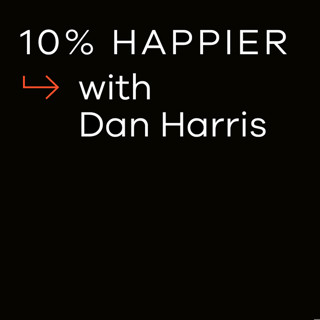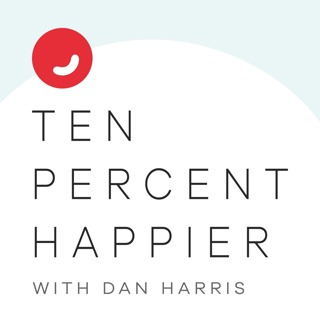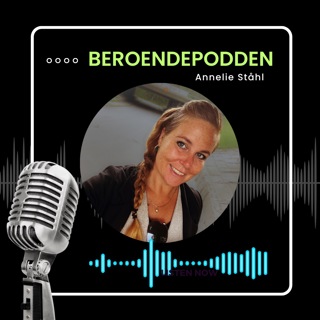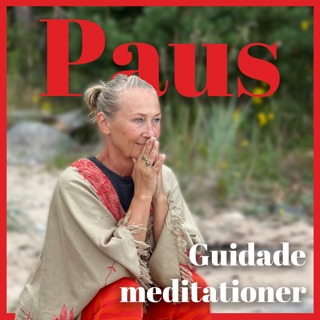
How Do I Meditate When There’s a War Going On? | Claude AnShin Thomas
How can we meditate when it seems like the world is falling apart? How do we titrate our news consumption? What do we do with our fears about World War III? How can we do anything constructive to help given how far away many of us are from the action? Why are so many people so upset about Ukraine when they weren’t paying much attention to the wars raging in places like Syria, Yemen, or Ethiopia? Today’s guest is uniquely qualified to answer these questions, given his experience in combat. Claude AnShin Thomas is an ordained monk in the Japanese Soto Zen Tradition. At 17, he signed up to fight in Vietnam and spent his tour of duty in the theater of war, surrounded by death and destruction. He came home suffering from an undiagnosed case of PTSD and spent years grappling with addiction and homelessness before he was introduced to Buddhism. He says meditation can help all of us look at the roots of war and violence that we all harbor. Claude Anshin is now the founder of the Zaltho Foundation, dedicated to addressing the causes and consequences of violence in and among individuals, families, and societies. He has served in war zones, hospitals, schools, and prisons. He has also led meditation retreats at sites of war and suffering, and has worked with gang members, guerillas, and refugees. He is the author of the award-winning book At Hell's Gate: A Soldier's Journey from War to Peace, which has been translated into several languages, and Bringing Meditation to Life. This episode explores the above questions and additionally: The narcotic effect of war. How Buddhism helped Claude Anshin be at peace with what he calls his own unpeacefulness, and yet, why, to this day, he has to reckon with his impulse towards violence. Why he doesn’t believe there is such a thing as a “just war.” Content Warning: There are discussions of war, violence, suicide, and substance abuse throughout this episode. Full Shownotes: https://www.tenpercent.com/podcast-episode/claude-anshin-thomas-427
14 Mars 202251min

The Upside of Apocalypse | Lama Rod Owens
We’re now entering year three of the pandemic, and even though we’re in a very different stage of the game, there are still so many questions: Is it safe or ethical to return to “normal”? How do you deal with people who have different views on safety and vaccines? What do you do if you’re just bone tired of this whole mess? Today’s guest is Lama Rod Owens, who was trained in the Kagyu School of Tibetan Buddhism, holds a Master of Divinity degree in Buddhist Studies from Harvard Divinity School, and is the author of the book Love and Rage: The Path of Liberation Through Anger. Lama Rod has been kind enough to come on to the show during moments of crisis. I spoke with him shortly after the murder of George Floyd and also during the 2020 elections. As you’re about to hear, one of the core arguments he will make is that apocalypse (and he has a broad understanding of what that word means) can present an opportunity. This episode explores: The benefits of having an existing practice in times of heightened anxiety and uncertainty. Developing a direct, open relationship with fear. Working with regret. Why taking care of yourself is not selfish. Lama Rod’s take on social media and watching TV as a way to reset. The obstacles to empathy. A more expansive definition of the word violence. A jarring New York Times article that posits that the recent rise in pedestrian deaths could be in part due to social erosion created by the pandemic. Full Shownotes: https://www.tenpercent.com/podcast-episode/lama-rod-owens-427
11 Mars 20221h

Is It Possible You Are Irrational About COVID? | David Leonhardt
As we enter year three of the pandemic, the psychology of COVID is no less complex or consequential. This episode features one of the most prominent chroniclers of the pandemic, David Leonhardt from the New York Times, who argues that there is irrationality on all sides when it comes to the pandemic. He would also urge you to consider whether you might be over or underestimating the risks of COVID, based on where you stand politically. This episode also explores: the state of play in the pandemic right now and where we may be headed next; why and how attitudes about the pandemic, at least here in the US, have sorted along partisan lines; whether it makes sense to be angry with the unvaccinated; how a rise in vehicle crashes might speak to how COVID accelerated the fraying of America's social fabric; and David’s argument for why history and human decency can be a source of optimism going forward. David will also respond to his vehement critics who argue that his emphasis on lifting COVID restrictions and returning to some semblance of normalcy callously disregards the needs of the immunocompromised and unvaccinated. David Leonhardt is a senior writer for The New York Times. He writes The Morning, The Times’s flagship daily newsletter, and also writes for the Sunday Review section. He has worked at The Times since 1999 and has previously been an Op-Ed columnist, Washington bureau chief, co-host of “The Argument” podcast, founding editor of The Upshot section and a staff writer for The Times Magazine. In 2011, he received the Pulitzer Prize for commentary. Full Shownotes: https://www.tenpercent.com/podcast-episode/david-leonhardt-426
7 Mars 202255min

Compassion Is the Ultimate Tool for the Truly Ambitious | Paul Gilbert
Dr. Paul Gilbert OBE is a professor of psychology at the University of Derby, Founder and President of The Compassionate Mind Foundation, the founder of Compassion Focused Therapy, and in 2011 was awarded the Officer of the British Empire, or OBE, from Queen Elizabeth II for his continued contribution to mental healthcare. He’s also the author of several books including The Compassionate Mind, Living Like Crazy, Overcoming Depression, and his latest, Compassion Focused Therapy: Clinical Practice and Applications. This episode explores: What Compassion Focused Therapy actually is. Why he says wisdom and courage are key to compassion. Some surprising truths about your inner critic. How compassion can be used to your advantage, especially if you’re ambitious. The relevance of various meditation practices to cultivating compassion. How trauma can impact our ability to access compassion, and what we might do about it. The importance of the vagus nerve and its relationship to compassion, mindfulness, and friendship. Full Shownotes: https://www.tenpercent.com/podcast-episode/paul-gilbert-425
2 Mars 202251min

A Serious Case for Humor | Jennifer Aaker & Naomi Bagdonas
A common denominator among all of the great meditation teachers is a sense of humor. They take the teaching seriously, but they don’t take themselves seriously. So perhaps there’s a link between human flourishing and humor. That’s not to say you have to be hilarious in order to be happy, but it clearly helps a great deal not to take yourself so seriously. And it turns out that humor is a skill. Jennifer Aaker and Naomi Bagdonas co-teach a course at the Stanford Graduate School of Business, called, “Humor: Serious Business.” They also co-authored a book called, Humor, Seriously: Why Humor Is a Secret Weapon in Business and Life (and How Anyone Can Harness It. Even You.) Dr. Jennifer Aaker is the General Atlantic Professor at the Stanford Graduate School of Business whose work has been published in leading scientific journals and featured in The Economist, The New York Times, The Wall Street Journal, The Atlantic, and Science. Naomi Bagdonas is a lecturer at the Stanford Graduate School of Business and an executive coach. She trained formally at the Upright Citizens Brigade Theatre, teaches improv in San Francisco’s county jail, and performs in comedy venues. This episode explores: Why Naomi and Jennifer say we’ve fallen off a humor cliff The four main humor styles and how to figure out which is yours When self-deprecation works, and when it doesn’t How to conduct a humor audit How to sign off your emails The relationship between humor and status The connection between humor and love A taxonomy of workplace humor The different types of humor fails, and what to do about them Full Shownotes: https://www.tenpercent.com/podcast-episode/jennifer-aaker-naomi-bagdonas-423
2 Mars 20221h 7min

Become an Active Operator of Your Nervous System | Deb Dana
We don’t think about it this way, but as we move through the day, the various moods we inhabit — excitement, engagement, aggression, fear, dejection — they’re all dictated by, or correlated with, our nervous system, or to be specific, our autonomic nervous system. The guest for this episode explains how you can become an active operator of your own nervous system. Deb Dana is a licensed clinical social worker, clinician, and consultant who specializes in working with complex trauma — although the advice in this episode can apply to everyone. She is also the author of Anchored: How to Befriend Your Nervous System Using Polyvagal Theory. This episode explores: What polyvagal theory is. The case for understanding our nervous system. The practical tools and exercises for changing our nervous system and learning to become more regulated. The fact that our nervous systems aren’t simply isolated, self-contained phenomena – they are social structures. Our responsibilities for our own nervous system and the nervous systems of others. Full Shownotes: https://www.tenpercent.com/podcast-episode/deb-dana-424
28 Feb 202259min

Climate Change as an Opportunity | Bhikkhu Anālayo
Today’s guest makes an extremely convincing case that there are many self-interested reasons to look squarely at the reality of climate change. Bhikkhu Anālayo, who is originally from Germany, is a renowned scholar-monk, a faculty member at the Barre Center for Buddhist Studies and the author of numerous books on meditation and early Buddhism, including Satipatthāna: The Direct Path to Realization, which has been very influential with many of the teachers you’ve heard on this show, including Joseph Goldstein. This episode focuses on another of his books, called Mindfully Facing Climate Change. This episode explores: The four types of meditation Anālayo recommends for mindfully confronting climate change Anālayo’s contention that meditation isn’t about ceasing the flow of thoughts, but rather ceasing our belief in the thoughts The question of whether individual actions matter in the face of a global crisis Anālayo’s compelling case for a kind of practice called death contemplation Full Shownotes: https://www.tenpercent.com/podcast-episode/bhikku-anālayo-422
28 Feb 202255min

There’s No Part of Your Life You Can’t Make More Awesome | Jeff Warren
It is very easy to think about your meditation practice as being quarantined to those minutes when you’re dutifully sitting down with your eyes closed. But actually the point is to turn your whole life into a practice. Our guest Jeff Warren has a very broad, capacious understanding of the concept of practice. There’s formal meditation practice, but also: movement practice, work practice, relationship practice, sleep practice, art practice, and more. It’s really about the goal, which few of us will ever fully attain, of turning everything you do into something intentional and illuminating. Jeff Warren is a frequent guest and good friend to the Ten Percent Happier podcast and app. He co-wrote a book with Dan called Meditation for Fidgety Skeptics. He’s a longtime meditation teacher, and the founder of the Toronto-based Consciousness Explorers Club. He is also the cohost of an excellent new podcast, called The Consciousness Explorers Podcast. In every episode Jeff, and his co-host Tasha Schumann test out a new practice. Be sure to check it out. This episode explores: what it might mean to make your whole life a practice; how to connect with your baseline okayness; mindfulness of seeing; Koan practice; running as practice; being your own teacher; how (and why) to make your practice social; and practicing with ADHD, a condition with which Jeff has lived with for many years. Full Shownotes: https://www.tenpercent.com/podcast-episode/jeff-warren-421
23 Feb 202259min






















